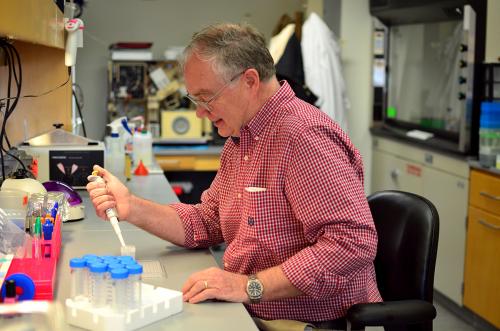
When Michael Lynes was a postdoctoral fellow, his adviser had a sign over the lab door that read “do it over.” Lynes – now Professor and Head of the Department of Molecular and Cell Biology at the University of Connecticut – has been following this advice ever since, meticulously conducting and repeating experiments to ensure his data is reliable.
For over five years, Lynes and his Belgian collaborators from the University of Ghent have been working on research focusing on how a stress response protein that has been extensively studied in the Lynes lab alters the progression of inflammatory bowel disease (IBD). IBD is an autoimmune disease of the digestive tract that takes many forms including Ulcerative Colitis and Crohn’s Disease. Lynes and his UConn team have produced an antibody that has been shown to change how immune cells move in the body, and which prevents these cells from attacking its intestines. This research has dramatically reduced the symptoms of inflammatory bowel disease in a number of different mouse models of this debilitating disease. The hope is that this work will be shown to have the same effects on humans, thereby paving the way for translation into a therapeutic that would limit the “flare ups” that cause someone with IBD to experience extreme pain and other severe and sometimes life-threatening symptoms. For the 1.3 million patients in the United States with IBD, it is a difficult disease to treat – it has no cure and often requires hospitalizations (92,000 hospitalizations per year in the United States) as well as surgery (75% of those with Crohn’s, 25% of those with Colitis will have at least one major surgery during their lifetime). *
The translation of Lynes’ work into a treatment that will help patients with IBD is exciting, but not without challenges. Making this transition from basic research to commercialization is a long, expensive, and intensive process and that is where PITCH has been invaluable for Lynes and his team. PITCH coordinated the resources to support antibody scale up, quality control, activity testing as well as a thorough analysis of animal data including all the key metrics investors want to see. Lynes notes, “PITCH provided early funds to do a head to head comparison of our antibody with a well-established therapeutic in mouse models. Our therapeutic worked much better in the mouse models and our experiments so far have shown fewer side effects. PITCH’s investment helped provide us with very persuasive data that, in turn, enabled us to receive further funding from the State to pay for conversion of the mouse antibody to a humanized form that can be used therapeutically.” For this work, PITCH supported third party validation with an external lab that runs many of these studies. Members of this lab expressed strong enthusiasm and were highly persuaded by the quality and strength of the data from the Lynes antibody. In addition to providing the kinds of funding and resources that is rare to receive from NIH or other federal programs, PITCH has provided Lynes with guidance on presenting to venture capitalists and other investors. Several investment firms have shown interest in the potential of this work to treat IBD and Lynes is hopeful. As only a great scientist can, Lynes sums up PITCH’s impact on his project like this, “PITCH is like the seed added to a saturated sugar solution. The dissolved sugar forms around the seed to make rock candy – all the sugar comes out of solution and you are left with beautiful crystals.”
* Data from the Centers for Disease Control, and Prevention
https://www.cdc.gov/ibd/pdf/inflammatory-bowel-disease-an-expensive-dise…
**Image of Michael Lynes, Photo by Taylor Hudak/UConn
